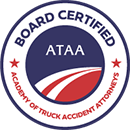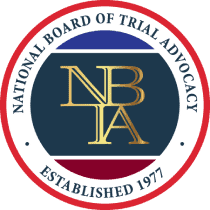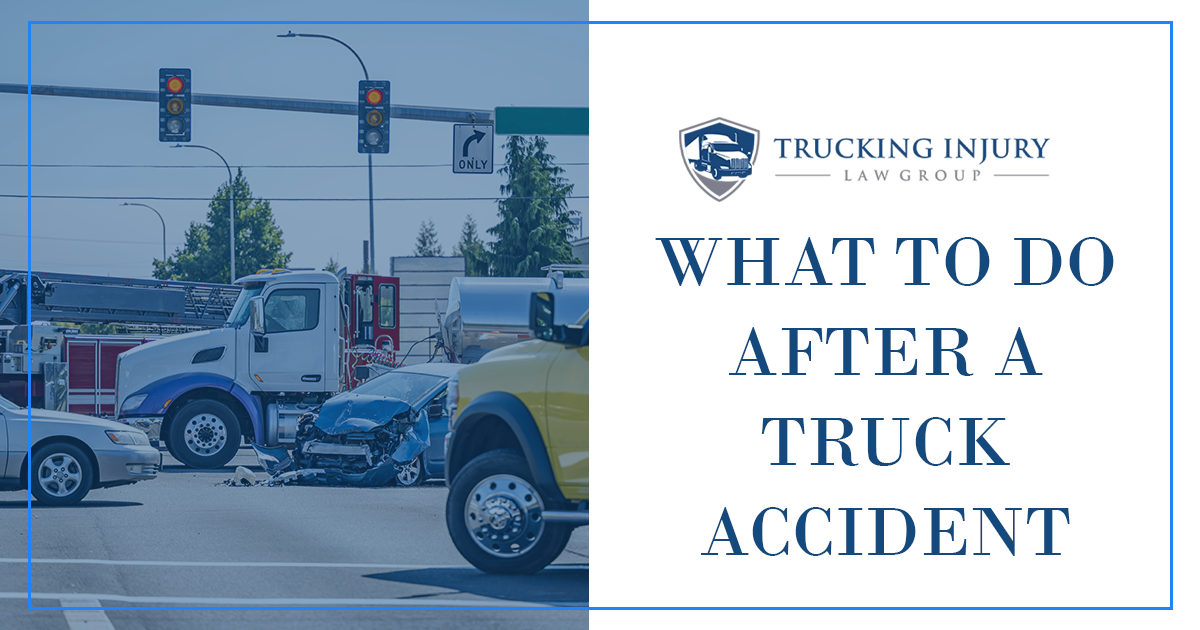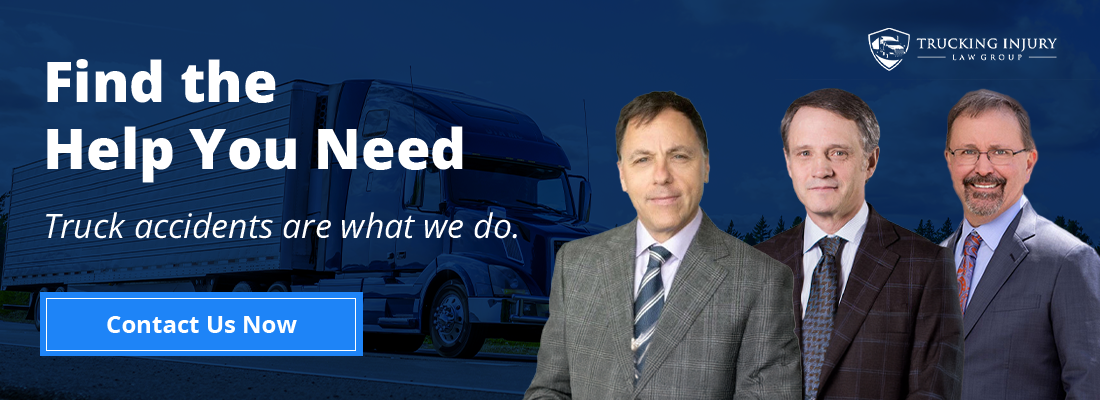What To Do After a Truck Accident
When you have been involved in a truck accident, figuring out what to do next can be hard. You might be concerned about injuries or damage to your vehicle. What you do next could majorly impact your insurance claim or even legal case.
At Trucking Injury Law Group, we know these incidents are traumatic, and you might not know what to do after a truck accident.
For that reason, we have compiled a step-by-step process for what you need to do at the scene and what to do once you arrive home.
What To Do at the Truck Accident Scene
Being involved in a trucking accident can be a jarring experience. Many people are left stunned by the incident. However, if you can compose yourself and are not seriously hurt, here are a few steps to take immediately after a crash involving a tractor-trailer or any other truck.
Check for Injuries
In a truck accident, your well-being and that of anyone else involved is the most important thing to consider. One of the first steps is to assess yourself and any passengers for injuries, even minor ones. Call for an ambulance and medical help immediately if anyone requires medical attention.
Unfortunately, truck accidents often result in serious injuries and even fatalities. According to the Federal Motor Carrier Safety Administration, there were 5,788 fatalities in crashes involving large trucks in 2021. Also, 154,993 individuals sustained injuries in traffic accidents involving large trucks.
After a collision with a truck, you will want to make sure that everyone gets the treatment they need.
If an accident happens on a busy road, move to a safe area away from traffic as soon as possible. You will want to turn on your hazard lights to alert other drivers. With that, you can prevent any more accidents or incidents from occurring.
Call the Police and Report the Accident
If you or someone else needs immediate medical help, call 911. The police and emergency personnel will arrive at the scene. Once everyone has been triaged and treated, the police will assess the scene. When you speak to an officer, you will want to be accurate and detailed. During this time, describe what happened leading up to the accident.
After law enforcement has finished investigating, you can get a copy of an official police report. This will document all the essential information about the incident. You can use it to pursue legal claims against the truck driver and trucking company.
Exchange Information with the Truck Driver
Whether you decide to pursue a legal case or just need to file an insurance claim, you will want to get the truck driver’s information. Make sure to collect:
- Full names
- Contact information, such as phone numbers and addresses
- CDL license information
- Trucking company names
- Insurance company names and policy numbers
- Vehicle registration details include license plate numbers, make, and model
Along with exchanging information, document the scene of the accident. You can use your phone or a notepad to record information. Take photos of the accident scene, including vehicle positions, damages, and road conditions.
If there are any witnesses, be sure to collect their statements, if possible. You might also want to record the weather conditions, visible injuries, and other information that could help with the insurance claim process.
Avoid Admitting Fault
When speaking to police, the truck driver, or witnesses, you will want to be careful with your words and avoid admitting fault. This doesn’t mean you should hide the truth or avoid taking responsibility for your actions. Instead, you should refrain from making statements that could be misinterpreted as an admission of guilt.
During this time, make sure of the facts and be honest about what you know and what you don’t know. If you’re not sure about something, it’s better to say so than to make a guess that could come back to haunt you later. Remember that admitting fault can have legal and financial consequences.
What To Do When You Get Home
Hopefully, you can return to your home immediately after the crash. Make sure to give yourself some time to rest and evaluate the next steps. Some suggested actions of what to do after a truck accident include:
Follow Up with All Medical Treatments
If you have been injured in a truck crash, you will always want to adhere to the treatment plans prescribed by your healthcare provider. You need to:
- Attend all follow-up appointments
- Take any prescribed medications as directed
- Complete any recommended therapies
During this time, you may want to monitor your symptoms closely and pay attention to any changes in your condition. If you experience new issues or worsening pain, make sure to contact your medical provider.
Your healthcare provider may also recommend physical therapy sessions and your treatment plan. Once again, you will want to participate in these sessions to show that you’re taking all the necessary steps to recover.
Whether you plan to file an insurance claim or a lawsuit, you need to document your recovery process. With that, you will want to keep track of test results, prescriptions, and any notes from your doctor. By keeping detailed records, this information will serve as valuable evidence of your injuries and treatment if you need to make a claim.
Additionally, keeping a personal diary can also be helpful. In this journal, you can document how the accident or injury has affected your daily life, both physically and emotionally. This information can be used during settlement negotiations. Don’t forget to note any psychological effects that you may be experiencing, such as anxiety or PTSD.
Document Your Financial Losses
After a truck accident, you need to start documenting your financial damages for recovery. These losses can often be extensive, so you will want to keep thorough records. Usually, costs include medical bills, vehicle repairs, lost wages, and future medical expenses related to your injury treatment.
You will want to gather all the medical-related documents, such as bills for emergency room visits, surgeries, medications, rehabilitation, and follow-up appointments. With that, you can show the immediate financial impact of the accident on your health. If your injuries require long-term treatment or physical therapy, make sure to document those future medical expenses as well.
If you have a damaged vehicle, collect the documentation regarding those expenses. You will want to keep the estimates from mechanics, parts and labor bills, and any transportation costs, like rental cars or public transport.
Additionally, track your lost wages. Many people have missed time from work due to medical appointments or recovery time. If your injuries prevent you from returning to work or reduce your earning capacity, document this, too.
Finally, you might incur incidental costs, such as modifications to your home for accessibility or psychological counseling. Once again, keep all records and documentation related to these expenses.
When it comes time to file a claim, your lawyer will use this information to make your case for compensation. You will want to make sure that every expense is accounted for in your lawsuit.
Reach Out to a Truck Accident Lawyer
If you or a loved one has been involved in a collision, you should consult a board-certified truck accident attorney. These legal professionals have the experience to handle these cases, especially when multiple parties are involved, or high-value claims are at stake.
When you hire a truck accident lawyer, they can be your legal advocate when gathering evidence and representing you during negotiations with insurance companies. Insurance companies often prioritize minimizing payouts, which never align with your best interests. With an attorney on your side, you can be assured they will do everything possible to seek the maximum compensation for your claim.
Seeking the services of a skilled truck accident lawyer may improve your chances of securing a fair settlement.
Contact Us to Learn More About What to Do After a Truck Accident
At Trucking Injury Law Group, we understand the unique challenges that truck accident victims face. That’s why we offer 100% free consultations to help you understand your rights, options, and the merits and challenges of your case.
Our board-certified trucking injury attorneys have years of experience representing clients in complex truck accident cases, and we’re here to assist during this difficult time.
Whether dealing with medical bills, lost wages, or other damages, we’re here to help you get the compensation you need and deserve.
On any list of what to do after a truck accident, one of the first priorities is to reach out to a lawyer. So, contact our office today to schedule a no-obligation meeting with one of our attorneys. We’ll listen to your story, answer your questions, and help you understand your legal options. Call us today to get the help you need.








